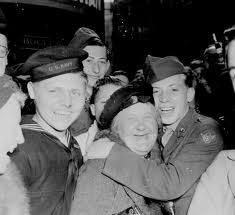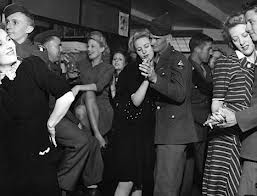|
10/9/01
American Men Are So Handsome
There was an interesting programme in the series of Channel 4's Secret History a few days ago. It gave an insight into the circumstances which contributed to the dramatic increase in the crime rate in Britain during World War Two. From 1939 to 1945 the prison population grew by more than 40 per cent as life on the home front - when people endured bombing raids, shortages and tragedies - created ideal opportunities for those with criminal tendencies to break the law. Of particular interest was the way in which criminal activities 'of the dark' increased. there was a roaring trade in prostitution In London, for example, there was a roaring trade in prostitution as soldiers home on leave came to the UK capital seeking the high life - cinema, dancing, gambling, night clubs, alcohol etc. And women came from as far away as Wales to enjoy the nightlife. From Wales! London was one of the most exciting places to be. There was an explosion of hedonism, perhaps partly as a result of the war itself. After all, people never knew what might happen tomorrow, or next month. There was uncertainty. And the policy of many was to live for the day.
Indeed, many of the young women travelled to the city not only for leisure purposes but to take part in the lucrative sex trade. They were the 'amateur' prostitutes, who spent, perhaps, just a week or so in London in order to earn 'extra' money to take back home for scarce luxuries. When they ran out and needed more, they simply returned to the capital. There were always thousands of American GI's in London and in other major cities, on leave for a couple of weeks, and they were very willing and eager to have a good time. the American GI's were the tops. The UK girls adored them And the American GI's were the tops. The UK girls adored them. They found them handsome, refreshing, fun and exhilarating. There was the Hollywood glamour about them, and they were considered to be very handsome indeed. They were romantic too.
Of course, relatively speaking, they were also quite rich! And they were certainly good for a few presents, such as stockings and chocolates - which were rare commodities in war-time Britain. It was every young girl's dream to capture an American and marry him. And young women flocked to the cities in the hope of meeting that special one. But what about OUR boys? - one wonders. (The less handsome ones.) What about all the British young men from the towns and the villages? (The ones without the glamour.) What were THEY doing while their young female COUNTERPARTS lived it up in the cities and sought good-looking American husbands? Well. They were mostly surviving, dying or being damaged in the most horrible of circumstances somewhere abroad. But the programme didn't mention this. Ah yes. Those were the days when women were 'oppressed'. |
|
‘Young Sluts and Vicious Debauchery' The following article will, perhaps, help to lay to rest the myth (currently being promulgated by the feminists and western governments) which tries to portray all sex workers as victims. For the most part, they are not - when compared to the rest of the population among whom they live. ... GIs in West End were led astray by ‘young sluts and vicious debauchery’ The Times (London) Good-time girls threatened morals, morale and international relations, the National Archive reveals THE “moral laxity” of women during the Second World War was perceived to be so degenerate that it strained relations between Britain and America. Ministers and their officials were so worried about the impact of promiscuity on public opinion in the United States that a series of high-level Whitehall meetings was held to devise ways of cracking down on immorality. The rift between Britain and its US ally came as thousands of American troops began to be stationed in or near London in 1942, documents released today at the National Archive in Kew, southwest London, reveal. the US troops proved to be irresistible to many British women While the popular impression of the influx of GIs was of an alluring group of men who were “overpaid, over-sexed and over here”, it transpires that they were not the sexual predators worrying Whitehall. Rather, the US troops proved to be irresistible to many British women, often living alone because of the war, and who in bleak wartime Britain were only too glad to grab the chance of some fun. American troops wrote home in such colourful terms about being propositioned by prostitutes and “good-time” girls in the West End of London that the US military demanded action be taken to curb the “debauchery”. So bad was the West End considered to be that US troops who caught venereal disease became known as “Piccadilly commandos”. there was a problem with “good-time girls” A report by a Superintendent Cole, the West End’s senior police officer, noted: “This district is an acknowledged ‘mecca’ of Service personnel”. He played down the scale of prostitution but accepted there was a problem with “good-time girls”. American views were shared by many British officials who were anxious that the licenciousness be halted for fear of handing a propaganda victory to the Axis powers. These fears were heightened when stories appeared in US newspapers portraying the West End as a seething mass of loose women. Admiral Sir Edward Evans, of the London Civil Defence regional headquarters, described the scenes at Leicester Square in a letter in 1943 to Air Vice- Marshal Sir Philip Game, the Metropolitan Police Commissioner. “Leicester Square at night is the resort of the worst type of women and girls consorting with men of the British and American Forces, in which the latter seem to predominate,” he said. “Of course the American soldiers are encouraged by these young sluts, many of whom should be serving in the Forces. At night the Square is apparently given over to a vicious debauchery.” A memorandum to Herbert Morrison, the Home Secretary, said that “there is a widespread demoralisation among girls resulting in a conspicuous initiative to promiscuous relations on the part of many of them”. In April 1943 the Home Office held a conference to consider the issue of promiscuity in the West End and the resultant “venereal disease and bastardy”. It was attended by ministeries and allied military personnel. American officers were worried about the effect that venereal disease would have upon their manpower but at least one, Brigadier General Hawley, accepted there was “no more moral laxity in this country than in the US ”. A series of measures was proposed, including banning women from certain streets where they might meet GIs A series of measures was proposed, including banning women from certain streets where they might meet GIs, but police were adamant that they were doing all that could be done and that the onus was on the US authorities to rein in their soldiers. Among moves taken by the US military was a scheme by which nurses would “discreetly” approach women who had passed on VD to troops to persuade them to be treated. Another was to reduce the money available to troops by encouraging them to bank a proportion of their pay. The Commissioner was impatient with American accusations that his men were doing too little. After a meeting with an American major and a judge he wrote: “I told them frankly it was our view the problem was best tackled from the other end, ie, by getting at the men and that, whilst it was a waste of breath to talk to a hard case, it was not a waste of breath to talk to a decent boy. “(The) Judge is very persistent in his idea that the boys should be able to write home saying that they never saw a doubtful lady in the streets of London. I pointed out that in these days it was quite impossible to distinguish many over-painted possibly respectable persons from the professionals and that to me, at any rate, they all looked the same.” |
|
'I'm Leaving You'
Daily Telegraph 13 Nov 2005 ... He survived the horrors of the trenches and the deprivations of a
prisoner of war camp but for Pte Harry Nelson the deadliest blow came
from the home front. Do not upset yourself over your little ones, for they are loved like me and well looked after "I hope you will not think it hard of me,
but I am going right away in another land to a better home. Do not
upset yourself over your little ones, for they are loved like me and
well looked after. I hope you will not come and try and find me, nor
take them away from me, for you are a man and I only a girl and their
mother. I hope you will not take this to heart too much "I hope you
will not take this to heart too much for I know it is hard on you, but
you will be better off without us, with your mother, and find someone to
love better than me. I must close now, hoping you will not try and find
us. Love from the little ones, they think he is their daddy (so he
is)." |
|
Also see, ... ... to see what our men were doing while the suffragettes were moaning about how poor was the plight of women. |
Recent comments from some emails which can be viewed in full here. ...
"I cannot thank you enough."
"I stumbled upon your web site yesterday. I read as much as I could in 24 hours of your pages."
"I want to offer you my sincere thanks."
"Your articles and site in general have changed my life."
"I have been reading your articles for hours ..."
"Firstly let me congratulate you on a truly wonderful site."
"I must say there aren't many sites that I regularly visit but yours certainly will be one of them, ..."
"It is terrific to happen upon your website."
"I just wanted to say thank you for making your brilliant website."
"Your site is brilliant. It gives me hours of entertainment."
"You are worth your weight in gold."
"Love your site, I visit it on a regular basis for relief, inspiration and for the sake of my own sanity in a world gone mad."
"I ventured onto your site ... it's ABSOLUTELY BRILLIANT, and has kept me enthralled for hours!"
"I love the site, and agree with about 98% of what you post."
"I have been reading your site for a while now – and it is the best thing ever."
"you are doing a fabulous job in exposing the lies that silly sods like me have swallowed for years."
On YouTube ...
Who Rules Over Us?
Part 1 On Free Will
Part 2 On Super-Organisms
Part 3 On Power
Part 4 On Reality
Popular articles ...
... War on Drugs - Who benefits from the war on drugs?
... A Woman Needs A Man Like A Fish Needs A Bicycle - Surely, the evidence would suggest otherwise.
... Why Governments Love Feminism - It is mostly to do with money and power, not equality.
... The Psychological Differences Between Men and Women - Are women really more emotional than men?
... Equality Between Men and Women Is Not Achievable - especially since Hilary Clinton said that, "Women are the primary victims of war."
... Cultural Marxism And Feminism - The connections between Cultural Marxism and Feminism.





